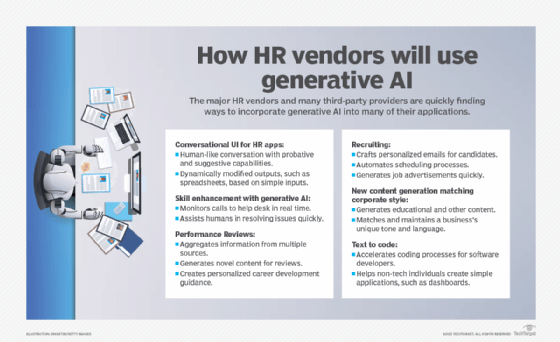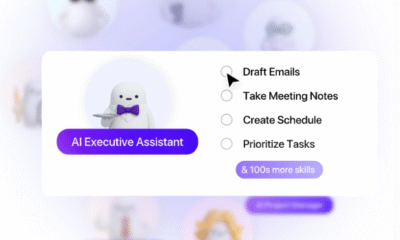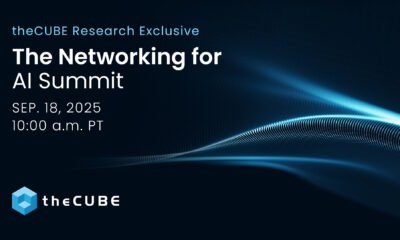Tools & Platforms
Workday acquires Sana Labs for $1.1B to upgrade agentic AI work experiences

Human resources and finance software giant Workday Inc. today announced the acquisition of Sana Labs AB, an artificial intelligence company offering enterprise knowledge and employee training tools, for about $1.1 billion.
Workday also announced new AI agents for HR, finance and industry use cases in its Illuminate platform alongside a new developer platform, including a low-code agent builder that will allow customers to deploy custom AI agents.
Founded in 2016, Sana has focused on developing AI tools to enhance the knowledge and understanding of employees in enterprises. The company’s main products include Sana Learn, a coaching and feedback tool featuring an AI tutor, and Sana Agents, AI-powered knowledge assistants that generate insights and content from enterprise data.
“Sana’s team, AI-native approach, and beautiful design perfectly align with our vision to reimagine the future of work,” said Gerrit Kazmaier, president of product and technology at Workday. “This will make Workday the new front door for work, delivering a proactive, personalized, and intelligent experience that unlocks unmatched AI capabilities for the workplace.”
Sana Learn will be used to complement Workday Learning by adding hyper-personalized skill building to Workday’s already existing learning suite to help employees train faster. Sana Agents provide capabilities beyond traditional chatbots by adding the ability to automate repetitive knowledge tasks and act proactively on users’ behalf. AI agents can streamline day-to-day work by completing mundane tasks such as scanning email for highlights and catching up on reports.
According to Sana, its agents have led to increased time savings and productivity gains. For instance, an unnamed leading American manufacturer achieved up to 95% time savings, while a multinational industrial technology company experienced a 90% increase in productivity.
Workday upgrades its AI agents and work tools
In addition to today’s acquisition news, Workday also announced new AI agents, including a Financial Close Agent and Case Agent, purpose-built for complex business processes like performance reviews, planning and assisting with financial use cases.
The new agents are part of Workday Illuminate, Workday’s AI platform. The company said the new agents are “purpose-built for work,” embedded with their respective industry use cases and powered by deep insights into business data and context.
The company’s new HR agents are designed to help reduce the administrative burden associated with attracting, retaining and engaging talent. According to Workday, these agents will improve the employee experience and allow HR teams to concentrate on strategic initiatives by automating time-consuming processes.
New agents include a Business Process Copilot that automates the setup of new business procedures to reduce manual effort, the aforementioned Case Agent that automates administrative tasks to reduce resolution times for employee needs, an Employee Sentiment Agent that analyzes employee feedback and a Performance Agent that tracks data from enterprise applications to streamline reviews and recommend actions.
To assist finance teams, the company introduced agents specifically designed for reconciliation, testing and planning. These agents help business leaders adapt to changing situations with valuable analysis and improved decision-making capabilities.
These new agents include a Cost and Profitability Agent that allows users to define allocation for costs and revenue based on natural language, a Financial Test Agent that tests financials to detect fraud and enable compliance and the Financial Close Agent that automates the finalization of accounting records to retain accurate financial statements.
For use cases not covered by these agents and Workday’s already existing AI agents, the company today announced Workday Build, a new developer platform that gives customers and partners the power to create and deploy their own AI-powered solutions. It includes Flowise Agent Builder, a low-code tool that makes building agents on the company’s platform simple for both non-technical and advanced users.
“The era of one-size-fits-all enterprise software is over,” said Peter Bailis, chief technology officer at Workday. “With Workday Build, customers go from consuming AI to creating with it, giving them the power to build intelligent solutions directly on their most trusted people and financial data.”
All of these capabilities will be powered by Workday Data Cloud, a new data layer announced today that the company said will connect AI agents to business intelligence and operational systems. In addition, Workday also announced partnerships with Databricks Inc., Salesforce Inc. and Snowflake Inc., permitting zero-copy access to HR and finance data within these data storage platforms.
Image: SiliconANGLE/Microsoft Designer
Support our mission to keep content open and free by engaging with theCUBE community. Join theCUBE’s Alumni Trust Network, where technology leaders connect, share intelligence and create opportunities.
- 15M+ viewers of theCUBE videos, powering conversations across AI, cloud, cybersecurity and more
- 11.4k+ theCUBE alumni — Connect with more than 11,400 tech and business leaders shaping the future through a unique trusted-based network.
About SiliconANGLE Media
Founded by tech visionaries John Furrier and Dave Vellante, SiliconANGLE Media has built a dynamic ecosystem of industry-leading digital media brands that reach 15+ million elite tech professionals. Our new proprietary theCUBE AI Video Cloud is breaking ground in audience interaction, leveraging theCUBEai.com neural network to help technology companies make data-driven decisions and stay at the forefront of industry conversations.
Tools & Platforms
Tech giants to pour billions into UK AI. Here’s what we know so far

Microsoft CEO Satya Nadella speaks at Microsoft Build AI Day in Jakarta, Indonesia, on April 30, 2024.
Adek Berry | AFP | Getty Images
LONDON — Microsoft said on Tuesday that it plans to invest $30 billion in artificial intelligence infrastructure in the U.K. by 2028.
The investment includes $15 billion in capital expenditures and $15 billion in its U.K. operations, Microsoft said. The company said the investment would enable it to build the U.K.’s “largest supercomputer,” with more than 23,000 advanced graphics processing units, in partnership with Nscale, a British cloud computing firm.
The spending commitment comes as President Donald Trump embarks on a state visit to Britain. Trump arrived in the U.K. Tuesday evening and is set to be greeted at Windsor Castle on Wednesday by King Charles and Queen Camilla.
During his visit, all eyes are on U.K. Prime Minister Keir Starmer, who is under pressure to bring stability to the country after the exit of Deputy Prime Minister Angela Rayner over a house tax scandal and a major cabinet reshuffle.
On a call with reporters on Tuesday, Microsoft President Brad Smith said his stance on the U.K. has warmed over the years. He previously criticized the country over its attempt in 2023 to block the tech giant’s $69 billion acquisition of video game developer Activision-Blizzard. The deal was cleared by the U.K.s competition regulator later that year.
“I haven’t always been optimistic every single day about the business climate in the U.K.,” Smith said. However, he added, “I am very encouraged by the steps that the government has taken over the last few years.”
“Just a few years ago, this kind of investment would have been inconceivable because of the regulatory climate then and because there just wasn’t the need or demand for this kind of large AI investment,” Smith said.
Starmer and Trump are expected to sign a new deal Wednesday “to unlock investment and collaboration in AI, Quantum, and Nuclear technologies,” the government said in a statement late Tuesday.
Tools & Platforms
Workday previews a dozen AI agents, acquires Sana
After introducing its first AI agents for its HR and financial users last year, Workday returns this year with more prebuilt agents, a data layer for agents to feed analytics systems, and developer tools for custom agents.
The company also said it entered a definitive agreement to acquire Sana, whose AI-based tools enable learning and content creation. Workday said the acquisition will cost $1.1 billion and expects it to close by Jan. 31.
Workday has been on a tear with acquisitions this year. It reached an agreement to buy Paradox, an AI agent builder that automates tasks such as candidate screening, texting and interview scheduling. The deal is expected to close by the end of October. In April, Workday acquired Flowise, an AI agent builder.
HR software, in general, is complex compared with enterprise systems such as CRM, said Josh Bersin, an independent HR technology analyst. Because of that, some HR vendors will have to add agentic AI functionality through acquisition. Workday’s acquisitions this year coincide with the hiring of former SAP S/4HANA and analytics leader Gerrit Kazmaier as its president of product and technology.
“Workday knows that the architecture they have is not going to quickly get them to the world of agents — they can’t build agents fast enough to work across the proprietary workflow system that they have,” Bersin said. “Their direct competitors, SAP and Oracle, are all in the same boat.”
Agents, tools to come
Workday previewed several agents to automate HR work, including the Business Process Copilot Agent, which configures Workday for individual user tasks; Document Intelligence for Contingent Labor Agent, which manages scope of work processes and aligns contracts; Employee Sentiment Agent, which analyzes employee feedback; Job Architecture Agent, which automates job creation, titles and management; and Performance Agent, which surveys data across Workday and assembles it for performance reviews.
Another tool, Case Agent, can potentially be a significant time-saver for HR workers, said Peter Bailis, chief technology officer at Workday. He is a former Google AI for cloud analytics executive who also recently joined the company.
“One of the biggest challenges in HR [is when] an employee has a critical question,” Bailis said. “But their questions are often complex, and processing times for HR departments are often long.”
The case agent can review similar cases in HR, apply the right regional and compliance context, and draft a tailored response for humans to review and deliver.
“The most important part — caring for employees — stays human,” Bailis said.
On the financials side, Workday previewed Cost & Profitability Agent, which enables users to define allocation rules with natural language to derive insights; Financial Close Agent, which automates closing processes; and Financial Test Agent, which analyzes financials to detect fraud and enable compliance. For the education vertical, Workday plans to release Student Administration Agent and Academic Requirements Agent.
Workday also plans agents that bring the functionality of recent acquisitions Paradox and Flowise to its platform.
Expected in the next platform update is the zero-copy Workday Data Cloud, which brings together Workday data with other operational systems such as sales and risk management for analytics, forecasting and planning. Also in the works is Workday Build, a developer platform that includes no-code features from Flowise that enables the creation of custom agents.

How AI will affect HR jobs
The AI transformation Workday and the rest of the enterprise HR software market is undergoing will likely affect the ratios of HR workers to employees for large businesses, Bersin said.
Currently, many companies aim for an industry standard of one HR employee per 100 employees; with AI agents automating many administrative processes, he said he sees the potential for ratios of 1:200, 1:250, or — in the case of one client that Bersin’s company interviewed — possibly 1:400.
As such, automation will enable companies to do more work with smaller HR teams.
“In recruiting, there are sourcers, screeners, interview schedulers, people that do assessment, people that look at pay, people that write job offers, people that create start dates, people that do onboarding,” Bersin said. “Those jobs, maybe a third of them will go away. In learning and development, there’s a new era where a lot of the training content is being generated by AI.”
Workday previewed these features and announced the Sana acquisition in conjunction with its Workday Rising user conference in Las Vegas Sept. 15-18.
Don Fluckinger is a senior news writer for Informa TechTarget. He covers customer experience, digital experience management and end-user computing. Got a tip? Email him.
Tools & Platforms
Macy’s bets on automation to drive retail revival
Dive Brief:
- Macy’s wants to lower costs and unlock efficiencies, turning to AI and automation in its pursuit of momentum, executives said during a Goldman Sachs conference earlier this month.
- The company has set its sights on simplifying and automating processes, CEO and Chair Tony Spring said at the event. “That has to do with embracing the power of AI as well as generative AI, that had to do with making sure that we were taking cost out of the network,” said Spring. “In some cases, also speeding up the delivery of product to the customers where we were behind the competition.”
- The retailer is about 18 months into its three-year turnaround plan called Bold New Chapter, which focuses on improving experiences and operations. While executing the plan, Macy’s has simplified IT operations and moved more workloads to the cloud to operate at a lower cost and have access to more capabilities, according to COO and CFO Tom Edwards, who was appointed to the role in June.
Dive Insight:
Retailers are working to alleviate pressures caused by economic headwinds and changes in consumer spending. Several leading brands are placing confidence in technology to push the business forward.
Ralph Lauren, Under Armor, Williams-Sonoma and others have recently credited AI for improving operations and lowering costs as turmoil continues.
A year ago, Macy’s promoted CIO Keith Credendino to accelerate its modernization goals as part of the company’s growth strategy. Previously, Credendino served as SVP of technology product development for customer experience.
Macy’s has seen improvement from its AI-assisted turnaround efforts. Macy’s Inc. and its namesake retailer reported the strongest comparable sales results in Q2 2025 after 12 quarters of lackluster numbers. Still, tariffs cast a shadow on progress with a 2.5% year-over-year net sales decline.
Adding AI isn’t an easy win for retailers despite the focus. They face several adoption roadblocks, from high implementation costs to the risk of alienating customers, according to a Monday.com survey. More than 3 in 5 leaders in the industry worry about the consistency and quality of generated outputs.
-

 Business3 weeks ago
Business3 weeks agoThe Guardian view on Trump and the Fed: independence is no substitute for accountability | Editorial
-
Tools & Platforms1 month ago
Building Trust in Military AI Starts with Opening the Black Box – War on the Rocks
-

 Ethics & Policy2 months ago
Ethics & Policy2 months agoSDAIA Supports Saudi Arabia’s Leadership in Shaping Global AI Ethics, Policy, and Research – وكالة الأنباء السعودية
-

 Events & Conferences4 months ago
Events & Conferences4 months agoJourney to 1000 models: Scaling Instagram’s recommendation system
-

 Jobs & Careers3 months ago
Jobs & Careers3 months agoMumbai-based Perplexity Alternative Has 60k+ Users Without Funding
-

 Podcasts & Talks2 months ago
Podcasts & Talks2 months agoHappy 4th of July! 🎆 Made with Veo 3 in Gemini
-

 Education3 months ago
Education3 months agoVEX Robotics launches AI-powered classroom robotics system
-

 Education2 months ago
Education2 months agoMacron says UK and France have duty to tackle illegal migration ‘with humanity, solidarity and firmness’ – UK politics live | Politics
-

 Podcasts & Talks2 months ago
Podcasts & Talks2 months agoOpenAI 🤝 @teamganassi
-

 Funding & Business3 months ago
Funding & Business3 months agoKayak and Expedia race to build AI travel agents that turn social posts into itineraries

















